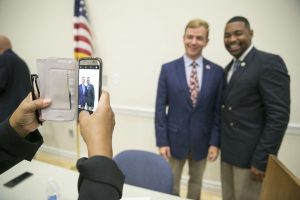 Last night, I attended the scheduled hearing which is part of the Lecky vs Virginia State Board of Elections lawsuit. This suit is part of an ongoing fight by voters in House District 28 (which encompasses parts of Stafford County and the City of Fredericksburg) who were disenfranchised by a series of voting irregularities.
Last night, I attended the scheduled hearing which is part of the Lecky vs Virginia State Board of Elections lawsuit. This suit is part of an ongoing fight by voters in House District 28 (which encompasses parts of Stafford County and the City of Fredericksburg) who were disenfranchised by a series of voting irregularities.
As a point of review, the margin of victory in this race came down to 73 votes after a recount, with a full 147 (or more) voters being given the wrong ballots on election day. (For a full recap of those irregularities, you can see my comments here)
- Some may argue that even with the difference in votes being half as much as the wrongly-assigned ballots, there likely wouldn’t be enough Democratic ballots in there to make a difference in the race. Here are some counterpoints to consider:
- Most (if not all) of the precincts where voters were assigned the wrong ballots were Democratic precincts.
- Democrats tend to get discouraged from voting a lot easier than Republicans, even with the current climate. That said, we have no way of knowing how many Democrats arrived at the polls, were given the wrong ballot, and decided not to vote when they didn’t see the right people for delegate.
- Almost all projections of how well Democrats would perform in last year’s general election were shattered. The-powers-that-be did not think that Joshua Cole would come anywhere close to beating a Republican in a district once held by Republican Speaker Bill Howell, let alone falling short by only 73 votes. Even the optimistic among us were proved wrong by how well we did.
- African American candidates tend to overperform in this particular section of the commonwealth from the few examples we have. Jennifer Carroll Foy, Josh King, and Michael Futtrell who ran in neighboring House District 2, for example, all proved to outperform previous projections. The only caveat here is that in the Democratic primary last year, Jennifer Carroll Foy ran against Josh King before moving onto the General Election.
Combine all of the above with a candidate of unique background – a young black pastor with refreshingly progressive views – and you have someone that was made to defy electoral expectations. Especially with the nature of last year’s electorate.
As for the case itself. Judge Ellis unfortunately did not rule in favor of the voters. Without going too far into the legalese, he didn’t feel that those representing the voters came up with enough evidence to show that the problems were severe or wide-spread enough to warrant federal interference in the matter. The crux of the argument made by the other side (including the lawyers representing Republican Bob Thomas, who “defeated” Democrat Joshua Cole on election day) is that the irregularities are of a “garden variety.” Basically, the problems were small and arose from human and system error, not on a large scale or with the intent to disenfranchise.
He left the door open for additional legal arguments, but at the moment said that he didn’t think the voters had enough evidence to prevail in federal court.
Let’s take this last moment to reflect on that last part. Taking out the legal perspective of the argument (which I will agree the judge did a good job of explaining,) the Republicans here essentially argued that there was no reason to stop Bob Thomas from being seated because there wasn’t ENOUGH disenfranchisement; that there weren’t ENOUGH voters they were wronged to warrant action taken by the judge.
This comes literally a day after a drawing was done to determine the winner of another district because these same folks argued that an overvote needed to be counted because each vote is sacred.
Let that sink in.
When you’re done, take a look at Washington Post‘s coverage, and join me in looking at some of the great bills Virginia House Democrats have filed to try and restore some sense of Electoral Justice to our commonwealth.



 Sign up for the Blue Virginia weekly newsletter
Sign up for the Blue Virginia weekly newsletter

![Audio: Sam Shirazi’s Detailed 2025 VA House of Delegates Preview Concludes, “Democrats are going to be on the offense trying to potentially flip those eight seats [held by Republicans but carried by Kamala Harris]”](https://bluevirginia.us/wp-content/uploads/2025/03/shirazihodpreview-238x178.jpg)






